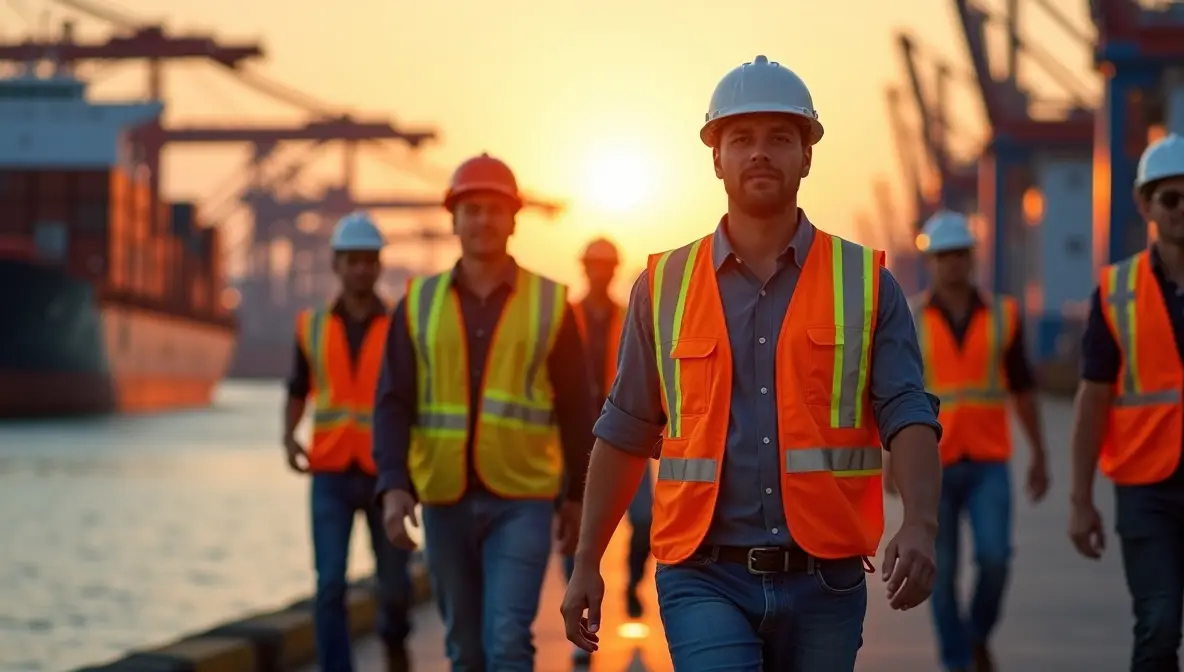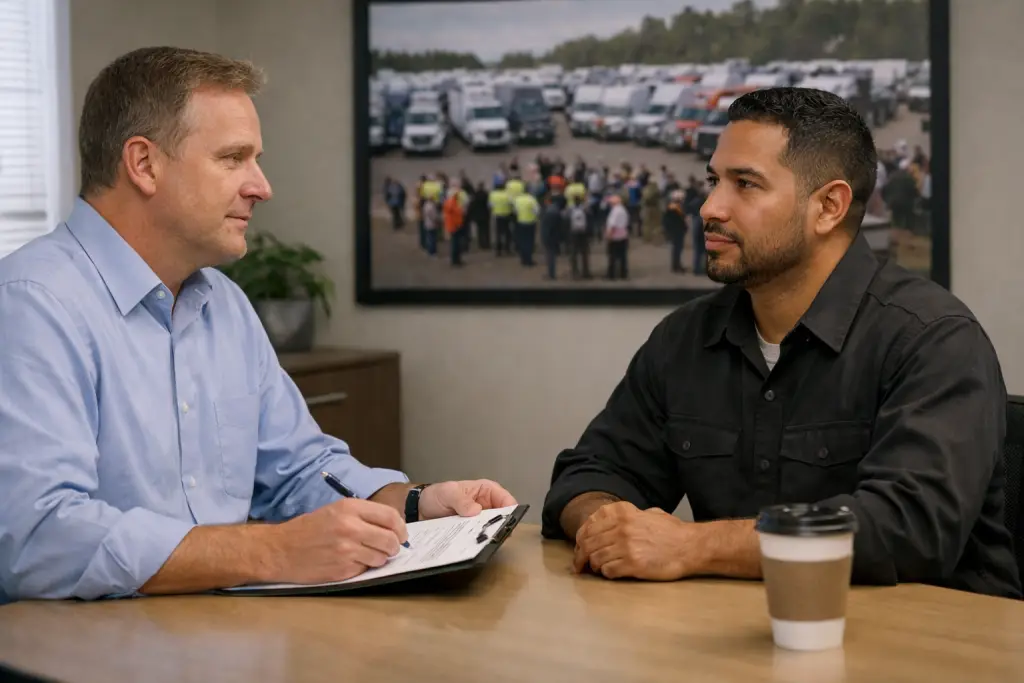Louisiana maritime workers must navigate a comprehensive three-tier security screening system involving TWIC cards, USCG credentials, and port-specific requirements, with the entire process typically taking 6-12 weeks and costing up to $800. Understanding Louisiana's worker protection laws, including the prohibition against charging employees for background checks, is essential for successfully entering this nearly 800,000-job industry.
Key Takeaways
- Louisiana maritime workers should begin the background check process early, as it can take several weeks to complete.
- State laws protect you from being charged for background checks, promoting fairness in maritime job applications.
- Keep accurate personal records to streamline the application process and resolve any potential issues efficiently.
- Recognize that each port has its own specific security requirements, so understanding these is crucial for compliance.
- If you run into obstacles, resources like legal professionals or career advisors can help you navigate the process smoothly.

Welcome to the world of Louisiana maritime, where the mighty Mississippi meets the resilient Gulf coast. With nearly 800,000 jobs tied to this thriving industry, getting a foot in the door means understanding the ins and outs of security protocols. Let's dissect the comprehensive security measures, from TWIC to USCG and beyond, that ensure both safety and opportunity for all maritime workers.
Louisiana State Background Check Laws
Louisiana has specific laws governing background checks that protect workers and ensure fair practices. Understanding these rules can be beneficial if you're eyeing a maritime position.
Louisiana Revised Statute 23:897
Employers in Louisiana cannot charge you for background checks, a protection that extends to all industries including maritime employment. This regulation helps ease the financial burden associated with applying for positions, ensuring equal opportunity for all candidates regardless of their economic status. If an employer requests you to cover the costs of a Louisiana maritime background check, they are in violation of this statute and could face legal penalties. The law was designed to prevent discrimination against job seekers who might not have the financial resources to pay for multiple background screenings. Maritime employers must absorb these costs as part of their hiring process, which helps create a more equitable job market for dock workers, crew members, and other maritime professionals.
Fair Credit Reporting Act (FCRA) Compliance
The FCRA sets the framework for how background checks are conducted nationwide, and Louisiana is no exception. As a job seeker, you should receive:
- Written Consent Request: Before conducting a background check, an employer must get your written consent on a separate document that cannot be buried within employment applications or other paperwork. For Louisiana maritime background check procedures, employers must clearly explain what type of screening will be conducted and obtain your signature before proceeding with any investigation.
- Adverse Action Notice: If something in your report affects hiring decisions, the employer must inform you and provide a copy of the report before making their final employment decision. Maritime employers conducting Louisiana maritime background checks must also provide you with information about your rights to dispute inaccurate findings and contact details for the reporting agency.
- Dispute Mechanism: If there are errors in your report, you have the right to dispute them, and the reporting agency must investigate within 30 days by contacting information sources to verify disputed items. This protection is particularly important for maritime job seekers, as errors in a Louisiana maritime background check could unfairly disqualify candidates from safety-sensitive positions.
Compliance ensures that your background is evaluated fairly. Missteps by employers can lead to legal consequences, so keep informed about these rights.
Louisiana Criminal History Records
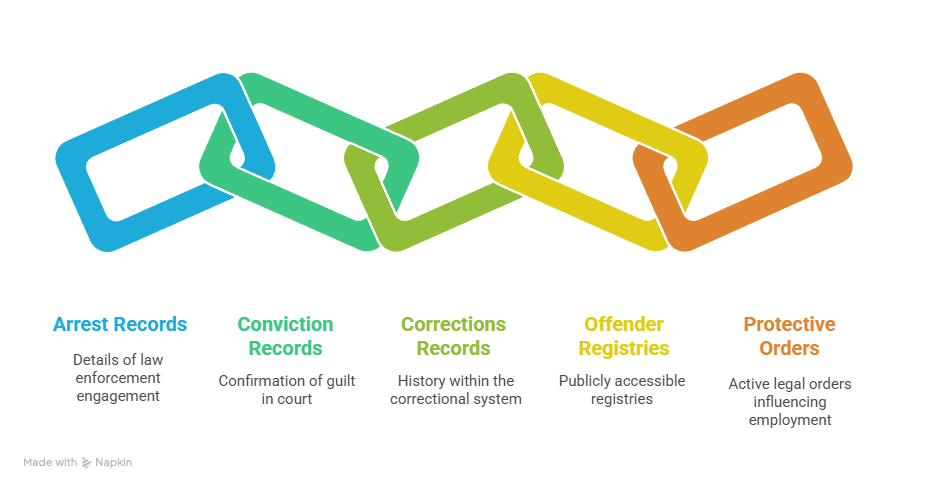
Criminal history checks are commonly part of the vetting process for maritime positions, as these roles often involve security-sensitive areas like ports and shipping facilities. The content includes arrests, convictions, and incarceration records, which are available through the Louisiana State Police Bureau of Criminal Identification and Information (BCII). Maritime employers find these records particularly useful for ensuring a safe workplace environment, especially given the federal security requirements surrounding port operations. Louisiana maritime background check procedures often involve both state criminal records and federal database searches due to the interstate nature of shipping and transportation. The state maintains comprehensive records that help employers make informed decisions while balancing public safety concerns with fair employment practices.
Being aware of these laws and rights ensures you're not caught off guard during your job search. It also reassures you about the fairness of the process and the protections in place.
What is a Louisiana Maritime Background Check?
A Louisiana maritime background check is a tailored security procedure for those seeking employment in the state's maritime industry. Unlike standard job screenings, it integrates multiple layers of evaluation. At its core lies the TWIC card, which verifies an individual's identity and checks their criminal history against national databases. The U.S. Coast Guard adds another layer through their Merchant Mariner Credential process, examining federal, state, and local criminal records.
Each port in Louisiana can impose additional checks tailored to its specific threats and needs. This means that beyond obtaining a TWIC card and USCG clearance, workers might undergo port-specific screenings unique to Louisiana's diverse maritime operations. For instance, certain ports may include enhanced employment verification or require participation in security awareness training programs. These measures are designed to protect critical infrastructure, ensure compliance with regulations, and maintain the safety of those working in this critical economic sector.
If you're interested in a maritime career, you're probably wondering how these processes affect you. Understanding the requirements and having your documents ready is crucial. Successfully passing through these comprehensive checks is your ticket to accessing secured areas within Louisiana's bustling ports. Are you prepared for the challenge?
TWIC Card Requirements for Louisiana Maritime Workers
To work in Louisiana's maritime industry, securing a TWIC card is crucial. It's your ticket to accessing restricted areas in ports and on vessels.
What is a TWIC Card?
After 9/11, the Transportation Worker Identification Credential (TWIC) became the cornerstone of maritime facility security. It's required for workers accessing secured parts of ports and vessels, and in cargo-laden Louisiana, it's the definitive access pass. The card acts as your key to high-security areas of ships and port facilities. It carries with it an assurance that you've been screened by the Transportation Security Administration (TSA), making sure you're not a security threat.
TWIC Application Process in Louisiana
The TWIC application process involves several steps:
| Step | Task | Process |
|---|---|---|
| 1 | Apply Online | Submit an application through the TSA website to begin the process and show your commitment. |
| 2 | Document Verification | Provide acceptable ID (passport or state ID). Check TSAâs list to avoid last-minute issues. |
| 3 | Biometrics Collection | Schedule fingerprinting and photo capture to confirm your identity and prevent fraud. |
| 4 | Background Review | TSA conducts checks on criminal history and immigration status. Ensure your records are clean. |
| 5 | Card Issuance | TWIC card arrives by mail in 30â45 daysâyour key to maritime job opportunities. |
The cost of the TWIC card is approximately $125.25, but if you possess a valid CDL with a HAZMAT endorsement, you might qualify for a discount. Staying informed about these specifics enhances your chances of a smooth experience.
TWIC Disqualifying Offenses
When applying for a TWIC card in Louisiana, understanding disqualifying offenses is crucial. These can delay or prevent your eligibility entirely.
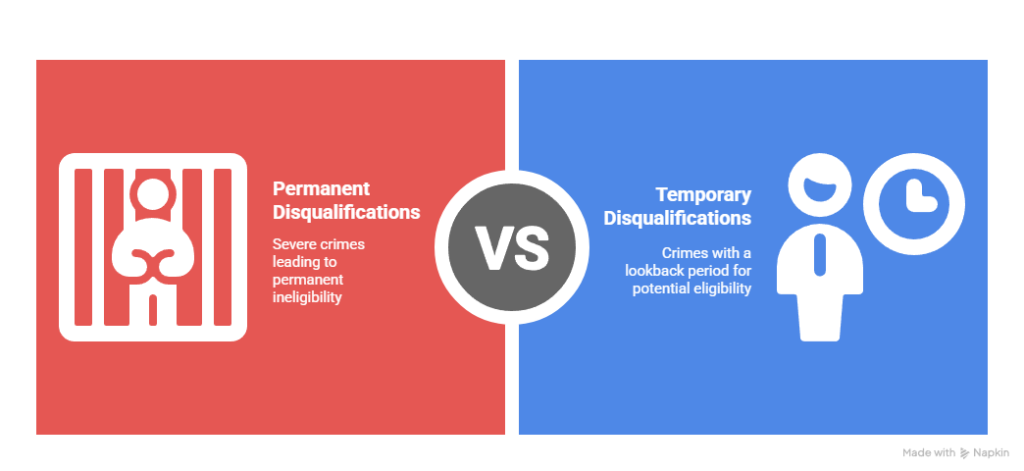
When applying for a TWIC card in Louisiana, understanding disqualifying offenses is crucial. These can delay or prevent your eligibility entirely.
Some severe crimes permanently ban access to TWIC cards, including espionage, terrorism, sedition, and treason. If convicted of these offenses, receiving a TWIC card becomes impossible.
Other crimes have set lookback periods, usually ranging from 5 to 7 years, such as extortion, fraud, robbery, and certain drug-related offenses. Once this period ends, you might become eligible again.
If you've faced any of these charges, consult legal counsel. They can help navigate the complex appeals process if you're initially denied. Knowing your legal options is essential in this dense and detail-oriented area.
U.S. Coast Guard Maritime Background Checks
USCG Merchant Mariner Credentials
Every maritime worker needs the right credentials. The U.S. Coast Guard (USCG) ensures mariners are fit for their roles through stringent screenings. To get a Merchant Mariner Credential (MMC), you face multiple checks. They dig into your criminal history both federally and locally. Drug and alcohol abuse records are also scrutinized. Mental fitness evaluations, though not always apparent, can tip the scales. Your peers and mentors may provide character references. These insights help the USCG determine your suitability for working on U.S. waters.
Medical Examinations and Drug Testing
The medical evaluation is not just a formality. It includes checking your vision, hearing, and cardiovascular health. Drug testing is a big deal, ensuring workers are always alert on duty. In Louisiana, you might face random drug tests. One positive result can lead to losing certification or employment. This relentless methodology keeps everyone in check and ultimately guards the safety of maritime operations.
Port-Specific Security Requirements
Louisiana Port Authority Screening
Louisiana's port authorities impose distinct security procedures beyond federal regulations. These specific checks are designed to ensure a high level of safety and reliability. When you aim to work at these ports, expect thorough scrutiny.
Police Checks: Collaboration with local law enforcement agencies is common. Background checks often include local criminal records. Being transparent about any history may facilitate the process.
Employment Verification: Past employment is examined closely. Be prepared to provide detailed employment history, including contact information for previous employers. Accurate and verifiable records are key for a smooth screening process.
Training Requirements: Ports often require completion of security awareness programs. These programs are designed to familiarize workers with potential threats and appropriate safety protocols. Be prepared to undertake such training as part of your onboarding process.
Continuous Vetting: Security doesn't stop after the initial check. Ports conduct regular reviews of personnel to ensure continued compliance with security standards. Maintain good records and update your personal information when necessary to avoid any issues during these routine checks.
Understanding and preparing for these requirements can make the difference between gaining or losing an opportunity. Keep your records organized, engage in necessary training, and maintain open communication with port authorities to ensure your suitability for port-specific roles.
Private Facility Requirements
Private facilities within Louisiana ports often adopt their own security measures. While there's a baseline set by federal guidelines, many outfits enhance procedures to fit specific operational needs. Companies may run in-depth financial checks on prospective employees. This helps determine if someone might be susceptible to bribery or corruption.
| Category | Description |
|---|---|
| Comprehensive Background Checks | Includes financial evaluations to check financial integrity in roles dealing with assets. |
| Advanced Tech Tools | Some facilities use social media screenings and may require polygraphs as part of assessing integrity and trustworthiness. |
| Mental Health Assessments | Periodic checks may be mandatory, especially for sensitive roles, ensuring a stable workforce environment. |
Are these measures excessive, or are they prudent steps to safeguard operations? How do they align with your personal comfort level or career goals? Understanding what's expected is key to navigating these layers without incident.
Oil and Gas Industry Specifications
Working offshore in the oil and gas industry requires more than just maritime skills. It's not for the faint of heart. Hereâs what you need to know before stepping into this demanding field:
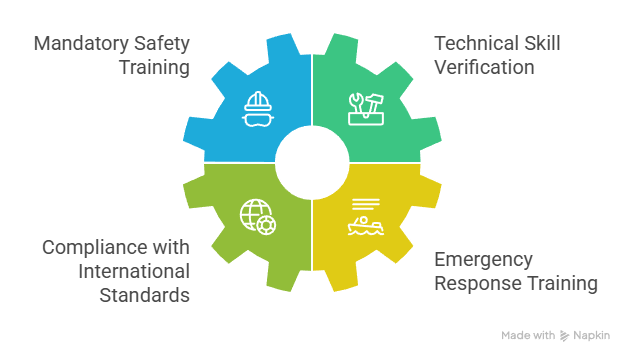
- Mandatory Safety Training: Workers must complete specific safety courses to be onboard, including safety evacuation procedures.
- Technical Skill Verification: Workers must demonstrate proficiency in requisite skills, with periodic assessments to ensure ongoing competency.
- Compliance with International Standards: International operations require adherence to global maritime laws and guidelines.
- Emergency Response Training: Regular drills prepare workers for potential offshore emergencies, ensuring readiness at all times.
In this field, rigor is the norm, not the exception. Are you up for the task?
Timeline and Process Overview
Standard Processing Timeline
Beginning your journey into maritime work requires careful planning. Hereâs a streamlined look at how the timeline often unfolds:
| Weeks 1-2 | Start the application by submitting your TWIC card forms. Ensure your documentsâlike ID and employment historyâare ready to go. |
| Weeks 3-4 | Complete your biometric screening, which includes fingerprinting and photos. Meanwhile, the documentation gets processed. |
| Weeks 5-6 | During this time, your background is subject to federal scrutiny. This can vary in duration based on individual backgrounds. |
| Weeks 7-8 | If your paperwork is in order and there's no red flag, expect your approval or potential next steps. |
Expedited Processing Options
When facing tight deadlines, emergency TWIC processing can accelerate your clearance if you're in a critical maritime role requiring immediate port access. Alternative credentials like the Merchant Mariner's Document may also provide faster approval in certain circumstances, though this depends on specific port regulations and USCG waivers. Having all documentation prepared and accurate from the start is essential, as any errors or missing paperwork will only delay the expedited process further.
Common Delays and Solutions
Delays often arise from issues like incomplete filings, discrepancies in names, or hard-to-retrieve international records. Solutions include:
- Double-check all documentation for accuracy.
- Ensure consistency across all ID submissions and applications.
- If facing overseas record challenges, liaise with local consulates or embassies early in the application process.
Keeping documents organized and ensuring they are fully transparent will aid in smoother processing, reducing the risk of unnecessary hold-ups.
Cost Breakdown and Financial Considerations
Understanding the financial side of preparing for a maritime career is crucial. Let's break it down step by step so you can budget effectively without surprises.
TWIC Card Fees
Before you even set foot at a port, obtaining a Transportation Worker Identification Credential (TWIC) card is mandatory. This comes at a cost. The standard fee is $125.25. For those holding a Commercial Driver's License (CDL) with a current HME or who have recently undergone a threat assessment, a reduced fee of $93 applies. If you need to replace a lost or damaged card, thatâll cost you an additional $60.
Additional Costs
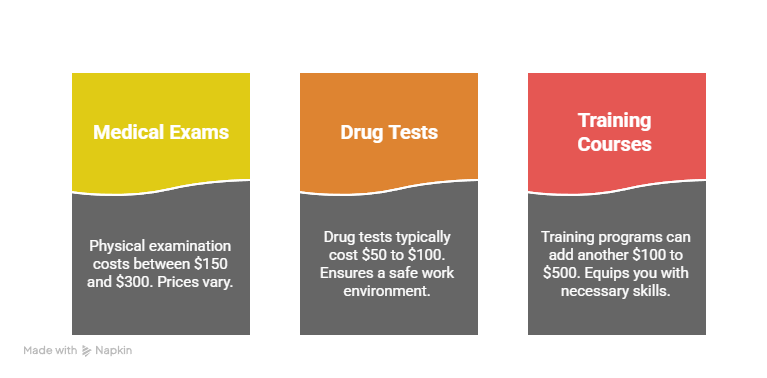
Besides the TWIC, there are other expenses tied to meeting maritime security requirements. Medical examinations can range between $150 and $300, depending on the comprehensive nature of the check. Drug testing typically costs $50 to $100. For training that ensures you meet safety and operational standards, expect to spend anywhere from $100 to $500. This depends on the specificity and length of the training programs you choose.
Employer Responsibilities
In Louisiana, employers typically shoulder the costs of background checks themselves. However, there are exceptions. Fees for TWIC cards, especially, remain the employee's responsibility in most cases. Also, any travel expenses related to obtaining these credentials or the time taken for screening processes are generally out-of-pocket costs for aspiring workers.
Approaching these costs with a plan helps avoid unexpected financial strain. Knowing who pays for whatâfrom yourself to your employerâallows you to focus on preparing for your maritime career without unnecessary detours.
Appeals and Reconsideration Process
TWIC Appeals Process
If you find yourself denied a TWIC card, don't panic. You have options. Start by writing an appeal within 60 days of receiving the denial. Your appeal should include solid evidence that counters the reasons for the denial. These might be documents showing rehabilitation efforts or clarifications on any errors. Hiring a lawyer could be beneficial to navigate the complexities of the process. Once your appeal is submitted, prepare for a wait of 120-180 days for a decision.
USCG Appeals Process
When facing denial of USCG credentials, the appeals process can vary. You can escalate your concerns to an administrative judge if needed, or resolve issues by submitting strong evidence. This could include demonstrating personal progress or providing context for past criminal records that might not have been assessed properly.
Common Appeal Grounds
Appeals often succeed when based on tangible rehabilitation efforts, instances of mistaken identity, procedural errors during the background check, or when criminal record context hasnât been considered thoroughly. Make sure your appeal addresses these possible grounds to increase the chance of a favorable outcome.
Industry-Specific Requirements
Offshore Oil and Gas
In offshore oil and gas, safety is non-negotiable. Employers expect you to hold verified safety certifications and undergo rigorous safety training. International maritime laws also come into play. You'll need a clear understanding and compliance since many ventures involve cross-border operations. Your technical skills will be thoroughly scrutinized. Being proficient in specialized equipment and procedures relevant to offshore platforms is crucial. Expect evaluations to test your competence in emergencies and everyday operations.
Port Operations
In port operations, background checks and qualifications focus on safety, competence, and trustworthiness. Hereâs what you can expect:
Forklift Certification: If your job involves operating a forklift, you will need a valid forklift operator certification. This ensures you can handle machinery safely and efficiently.
License Verification: Expect a review of commercial licenses and certifications related to your specific role within the port. This might include crane operation, heavy machinery, or specialized equipment licenses.
Security Awareness: You will need to demonstrate knowledge of security protocols, which is crucial for maintaining port safety. Training on these protocols is typically part of the onboarding process, as ports handle sensitive and high-value cargo.
Fitness Tests: Physical ability is often a part of port operations. Some roles may require you to pass fitness assessments that reflect the physical demands of the job. This ensures you can handle tasks like lifting, climbing, and prolonged standing.
Meeting these requirements not only satisfies port security but also protects you and your colleagues from accidents and liabilities. Prioritizing these checks and measures can secure your place in port operations and enhance your contribution to the team.
Maritime Transportation
For jobs in maritime transportation, expect thorough evaluations centered around your qualifications to operate vessels safely. Boat licenses are checked for currency and classfit to the vessel type. Your skills in navigation, such as chart plotting and understanding maritime signals, are crucial. Employers prioritize English language fluency for clear communication during operations and emergencies, ensuring smooth interactions aboard multinational crews.
Each sector has its distinct requirements, so it's vital you understand the specific expectations of your target job to prepare appropriately and ensure compliance.

Best Practices for Louisiana Maritime Workers
- Start Early: Begin the background check process well ahead of time. The entire process, from application to receiving your credentials, can take several weeks, especially if any issues or delays arise. Planning ahead gives you a better chance of moving smoothly through the system.
- Understand Your Legal Protections: Louisiana state law prohibits employers from charging you for background checks, ensuring you're not burdened by unnecessary costs. Familiarize yourself with these protections to advocate effectively for your rights.
- Keep Thorough Records: Maintain detailed personal records, including copies of all submitted documentation and correspondence. This helps if you need to clarify details or contest issues later on. Being organized and ready can prevent unnecessary setbacks.
- Stay Informed About Specific Requirements: Requirements vary by industry and port. It's crucial to understand the specifics of the job and location you're targeting. This knowledge will help you prepare adequately and ensure compliance with all required protocols.
- Seek Help When Necessary: If you encounter obstacles, donât hesitate to consult professionals. Whether it's a legal question or difficulty with the bureaucracy, there are resources to assist you. Lawyers experienced in maritime law or specialized career counselors can provide guidance and support.
Conclusion
Securing employment in Louisiana's maritime industry requires navigating a comprehensive Louisiana maritime background check process that encompasses federal TWIC requirements, USCG credentials, and port-specific security protocols. Success depends on early preparation, thorough documentation, and understanding the unique requirements of each facility within the state's diverse maritime landscape. While the screening process may seem complex, Louisiana's worker-protective laws and available resources ensure fair treatment throughout the credentialing journey. By staying informed about requirements and maintaining organized records, maritime workers can efficiently complete their Louisiana maritime background check and access the nearly 800,000 job opportunities within this vital industry.
Frequently Asked Questions
How long does a Louisiana maritime background check take?
A typical timeline for acquiring your TWIC card is 30 to 45 days. For USCG credentials, it might stretch to 90 days. However, unexpected delays can add more time.
What disqualifies someone from getting a TWIC card?
Offenses like terrorism and treason are permanent disqualifiers. Others, such as robbery and fraud, have a set lookback period during which they could disqualify you temporarily.
Can I work while my background check is pending?
Yes, you can work for up to 30 days under a TSA exemption, allowing you to commence employment while awaiting full clearance.
How much does the check cost?
The base fee for a TWIC card is $125.25. Additional expenses for medical exams and training can bring the total up to around $800.
What if I'm denied a TWIC card?
You have the right to appeal within 60 days. Gather supporting documents and consider legal assistance to strengthen your case.
Are all Louisiana maritime ports the same?
While the TWIC card is a universal requirement, individual ports may have additional security protocols specific to their operations or facilities.
Additional Resources
- TSA TWIC Enrollment
https://tsaenrollmentbyidemia.tsa.dhs.gov/programs/twic - TSA â Hazardous Materials Endorsement and TWIC Requirements (49 CFR Part 1572)
https://www.ecfr.gov/current/title-49/subtitle-B/chapter-XII/subchapter-D/part-1572 - Marine Information for Safety and Law Enforcement (MISLE) â U.S. Coast Guard
https://www.dco.uscg.mil/Our-Organization/Assistant-Commandant-for-Prevention-Policy-CG-5P/Inspections-Compliance-CG-5PC-/Office-of-Investigations-Enforcement/Marine-Information-for-Safety-Law-Enforcement-MISLE-/ - LAMA Note Regarding Contract Guards on Vessels
https://online.louisianamaritime.org/Files/publicFileStore/Misc/LAMA%20Note%20Regarding%20Contract%20Guards%20on%20Vessels.pdf

GCheck Editorial Team
Meet the GCheck Editorial Team, your trusted source for insightful and up-to-date information in the world of employment background checks. Committed to delivering the latest trends, best practices, and industry insights, our team is dedicated to keeping you informed.
With a passion for ensuring accuracy, compliance, and efficiency in background screening, we are your go-to experts in the field. Stay tuned for our comprehensive articles, guides, and analysis, designed to empower businesses and individuals with the knowledge they need to make informed decisions.
At GCheck, we're here to guide you through the complexities of background checks, every step of the way.
